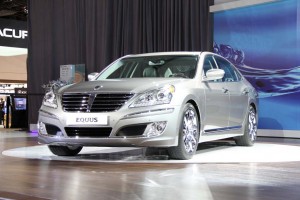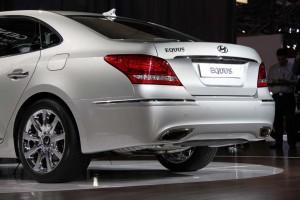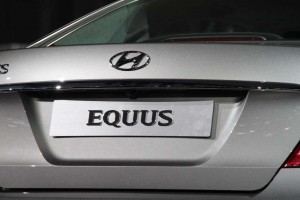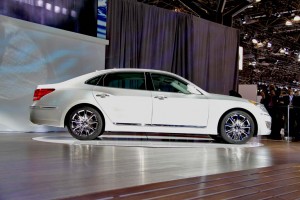
With the 2011 Hyundai Equus, the maker intends to take on the top luxury makers, including BMW, Mercedes and Lexus.
For a brand that was long a symbol of the most basic, cheap-and-cheerful products, Hyundai is doing a surprisingly effective job of redefining the luxury car market – a process it hopes to take a giant step further with the upcoming launch of the 2011 Hyundai Equus sedan.
Equus, making its debut at the New York International Auto Show, is a step up from the Hyundai Genesis sedan, the mid-luxury 4-door that, in January 2009, was named North American Car of the Year by a jury of 50 automotive journalists. Designed to go head-to-head with high-line competitors like the BMW 7-Series and Mercedes-Benz S-Class, the 2011 Equus will deliver all the standard features of a premium luxury sedan, from hand-finished wood and leather to its 608-watt, 17-speaker audio system.
As might also be expected of a Hyundai product, whatever the segment, price will also be a differentiator, Hyundai of America CEO John Krafcik hinting the final price for the 2011 Equus will come in “somewhere between $50,000 and $60,000. “ But perhaps the most intriguing selling point, he suggests, will be “innovative customer services to save our costumers time.”
Only about 300 Hyundai dealers are expected to represent the Equus line, less than 40% of the Korean maker’s total U.S. outlet. To qualify, they’ll have to operate exclusive showrooms and score well on customer satisfaction surveys. The retailers will also need to set up a separate showroom-within-a-showroom dedicated to Equus, and hire separate staff. Those sales personnel will, if a potential customer requests, go to a home or office to pitch the new product.
Meanwhile, when service is needed, an owner will be able to opt for home or office pickup and drop-off, and a Genesis sedan will be provided as a loaner vehicle.
There’ll be an emphasis on high-tech, down to the classic owner’s manual, which Hyundai plans to replace with a 7-inch video tablet. WiFi-enabled, it will even permit an Equus owner to use the tablet to schedule a service appointment.

While the 2011 Hyundai Equus will feature the usual assortment of high-line luxury features, the emphasis will be on individualized services, including at-home or office sales.
The focus on technology will also be seen in an array of infotainment and safety systems, from the Lexicon audio system to a navigation system featuring XM radio and real-time traffic. There’ll be 9 airbags, an advanced stability management system and Pre-Collision, technology designed to sense a potential accident and, if it can’t prevent a crash, to take steps to minimize injuries.
The driver’s seat will be both heated and cooled and be able to massage the motorist. Passengers will get 12-way power/memory seats, and if a buyer specifies the 4-passenger version, the two rear buckets will not only recline but offer private jet-style leg rests.
The 2011 Hyundai Equus styling will be familiar to those who’ve seen the Genesis sedan. Notably, the Korean maker has abandoned the ornate, winged hood ornament it considered offering when the Equus project was announced last year.
The sedan’s wheelbase will measure three inches longer than the Lexus LS460, a primary target for the new 2011 Hyundai Equus, and the Korean sedan, said Krafcik, will be larger than the LS in all other key dimensions.

With unusual features like a digital tablet owner's manual, will the 2011 Hyundai Equus lead or follow in the evolving luxury auto market.
Equus will borrow the 4.6-liter Tau V8 engine used in the Genesis, but here upgraded to produce 385 horsepower. It will be paired with a ZF 6-speed automatic gearbox and is tentatively rated at 16 mpg City, 24 Highway.
Initially, at least, CEO Krafcik said sales aspirations are “modest” for the 2011 Hyundai Equus, somewhere between 1,000 and 3,000 annually. “That allows us to do that Lexus can’t do for its customers because there are too many.”
Longer-term, however, few would be surprised to see Hyundai get ambitious. In fact, the automaker is known to be looking at a variety of other luxury products, though it will likely wait to see what reception the American version of the 2011 Equus gets before moving ahead with any of them.

